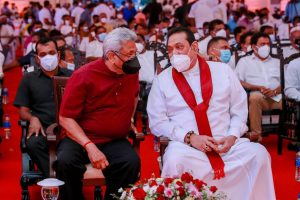On November 18, Gotabaya Rajapaksa will complete two years as Sri Lanka’s president. He won a decisive mandate; the Sinhalese-Buddhist nationalists, who comprise the island’s majority voted for him overwhelmingly.
However, his two years at the helm have been underwhelming.
In his election manifesto, Gotabaya promised to make Sri Lanka a “prosperous” country. But it is only the Rajapaksa family and some of its cronies who have prospered during the two years of Gotabaya’s presidency.
Consider this: The Sri Lankan Cabinet has five Rajapaksas, including four brothers – President Gotabaya; Prime Minister Mahinda, who was president in the 2005-15 period; Basil and Chamal—as well as Namal, who is Mahinda’s son. In addition, there are several Rajapaksas in junior ministerial posts and at the head of government departments and institutions.
The clan has always prospered with a Rajapaksa at the helm. During Mahinda’s presidency too, the family was well placed in top positions and posts.
It is estimated that about 75 percent of the total Sri Lankan budget is directly controlled by ministers of the Rajapaksa family at present. While the Rajapaksa family has prospered, the masses have not.
The economy is in a crisis. The COVID-19 pandemic dealt the economy a crippling blow as Sri Lanka is heavily dependent on tourism. Foreign exchange reserves fell from $7.5 billion in November 2019 when Gotabaya took office to $2.8 billion at the end of July 2021. With banks running out of forex to finance imports of essentials, the island was hit by a severe shortage of food and cooking gas among other things in August-September this year. It led to a spike in food prices, prompting President Gotabaya to declare a state of emergency on August 31 to halt hoarding.
But the pandemic alone isn’t to blame for the economic crisis. Gotabaya’s decisions are to blame too.
Soon after he became president, Gotabaya ordered sweeping tax cuts. Revenue fell by around 30 percent in 2020.
The government then went on a money printing spree. There was a 42 percent increase in the money injected into the economy between December 2019 and August 2021.
The decision was ill-conceived especially since the net growth of the economy over this period was just around 1 percent. It could pump up inflation to over 40 percent in the next few years, W. A. Wijewardena, a former central bank deputy governor, has warned.
Even as people were struggling with price rise and shortages, Gotabaya dealt them another blow. In May this year, his government banned the use of chemical fertilizers overnight. Organic fertilizer imported from China turned out to be toxic. Farmers were unable to begin sowing at the start of the monsoon season.
The chemical fertilizer ban is expected to reduce paddy output by 43 percent and cash crops like rubber, coconut and tea exports by 40 percent, according to Jeevika Weerahewa, an agricultural economist. In addition to impacting Sri Lanka’s food security and exports, the fertilizer ban will hit livelihood in the agriculture sector. Two-thirds of Sri Lanka’s population depends on agriculture.
The government’s flawed policies and decisions can be traced to Gotabaya’s approach to governance. He has set up Task Forces to deal with an array of issues. Not only do these bypass legal structures to formulate policy but also, they are packed with serving and retired soldiers. While military personnel may get the job done quickly, they are not experts on the issues on which they are formulating policy.
The President’s Task Force on COVID-19 for instance is headed by Army Chief General Shavendra Silva. Twenty-five district units are headed by a major-general and packed with soldiers. It isn’t virologists and immunologists who have crafted country’s counter-COVID strategy but military men with little understanding of how viruses mutate. Not surprisingly the third wave has been very severe.
Sri Lankan analysts have pointed out that despite the enormous hardships that ordinary people have suffered on account of the economic crisis and the pandemic, the government has not intervened to alleviate their suffering.
Not surprisingly, anger with the Rajapaksas is growing.
The Gotabaya government “is now facing open defiance and protests by three large segments of citizens who may have overwhelmingly voted for him in November 2019: rural farmers, small producers engaged in export agriculture, and public sector schoolteachers,” writes Sri Lankan political analyst Jayadeva Uyangoda. “Many of them,” he says, “now regret that they have voted such a band of rulers into power.”
There are rumbles of discontent in the government. Allies of the ruling Sri Lanka Podujana Party are not the only ones unhappy with not being consulted. SLPP ministers too are reportedly frustrated as they have been rendered irrelevant by the Task Forces.
Gotabaya has another three years before the next presidential election. However, his governance may be put to test in 2022 should the government decide to hold the long-overdue elections to nine provincial councils.
Despite his unimpressive two years, Gotabaya’s grip on power remains strong.
The opposition remains in disarray. Unless it rallies behind a strong leader, Gotabaya can be expected to return for a second term.
Even if his support among his core constituency, the Sinhalese-Buddhists, is eroding, he will act rebuild that support. He can be expected to step up communal polarization in Sri Lanka in the run up to elections. So deep is Islamophobia in the country that any step to weaken Muslims and their identity will set off a wave of Buddhist triumphalism, which will bring him the votes. Gotabaya is already taking steps in this direction.
In October, the government set up a “Presidential Task Force for One Country, One Law.” Headed by Gnanasara Thero, a hardline Buddhist monk who is virulently anti-Muslim and had spearheaded anti-Muslim violence some years ago, the Task Force will amend Muslim personal laws. The Gotabaya government is also set to implement the cow slaughter ban.
Such steps can be expected to reassure Buddhist hardliners that their interests are safe in Gotabaya’s hands.

































